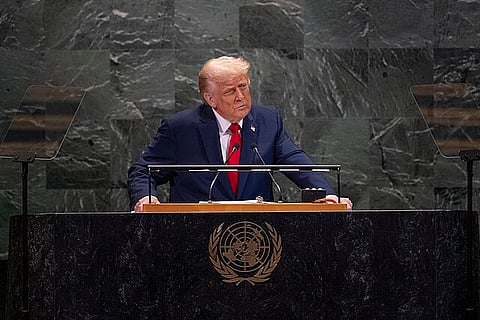

Hamas has issued a conditional response to President Donald Trump's peace proposal, agreeing to key aspects like a prisoner exchange and handing over governance to Palestinian technocrats, but stopping short of accepting disarmament and calling for further negotiations. This sets the stage for a critical confrontation, as analysts highlight that the plan's inherent weaknesses and Israeli Prime Minister Benjamin Netanyahu's own political commitments make a genuine agreement unlikely, leaving Palestinian rights and sovereignty in jeopardy.
In its official response, Hamas struck a conciliatory but firm tone, agreeing to engage with the framework of the Trump plan while demanding further talks on the details. The group stated its approval to release all Israeli prisoners, both living and deceased, according to the exchange formula contained in the proposal. Furthermore, it expressed readiness to "hand over the administration of the Gaza Strip to a Palestinian body of independents (technocrats)" that would be based on Palestinian national consensus and have Arab and Islamic backing .
However, the group’s statement notably omitted any agreement to disarm, a central pillar of the Trump-Netanyahu proposal that Hamas has consistently rejected. Instead, Hamas affirmed its "readiness to immediately enter, through the mediators, into negotiations to discuss the details," indicating that the current plan is not a final agreement but a starting point for further bargaining . A senior Hamas official characterized this approach as looking for "gray areas within which we can move" .
While Hamas has signaled a willingness to transfer administrative control to a Palestinian body, Israeli Prime Minister Benjamin Netanyahu's position appears to make this a key point of contention. Analysts suggest that Netanyahu's acceptance of the Trump plan was a tactical maneuver under significant American pressure, and his true intentions are revealed by his statements to his domestic audience.
Standing beside Trump at the White House, Netanyahu endorsed the plan. Yet, just hours later, speaking in Hebrew, he assured his supporters that he "definitely had not agreed to a Palestinian state" and that the Israeli military would remain in most of Gaza . This duality reflects his difficult political position. His governing coalition relies on far-right ministers like Itamar Ben-Gvir and Bezalel Smotrich, who oppose any role for Palestinian governance in Gaza and have rejected the Trump plan . To preserve his government, Netanyahu has repeatedly chosen to align with the far-right, which seeks to expand Israeli control over Gaza, rather than with political opponents who have offered to support a ceasefire .
The Trump plan is viewed by many analysts as heavily favoring Israel and containing vague language that fails to secure Palestinian rights, making it a weak foundation for a lasting peace. The proposal is deliberately ambiguous on the most critical issues. It offers only a vague reference to a "credible pathway" to Palestinian statehood with no timelines, a formulation that allows Netanyahu to delay or ignore the issue indefinitely . While the plan says Israel will not annex or resettle Gaza, it simultaneously permits Israel to maintain an open-ended military presence along its border inside Gaza, creating a de facto permanent security buffer zone on Palestinian land .
This ambiguity is compounded by the fact that the plan does not mention the occupied West Bank, where settlement expansion continues at an accelerated pace. A senior United Nations official recently reported that Israeli authorities advanced or approved approximately 20,810 new housing units in the West Bank, and members of Netanyahu's own government have signed petitions calling for its annexation . This ongoing project of settlement undermines the contiguity of a future Palestinian state and signals that the Israeli government's goal may be permanent control, not a genuine peace based on Palestinian self-determination .
The international community, including the UN, has warned that such policies are eroding the very possibility of a two-state solution. As one UN official starkly put it, there is a collective duty to enable Palestinians to exercise their legal rights "before no land remains upon which to establish Palestine" .